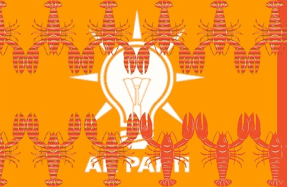Alexey Sidorenko: ‘As we speak, with every new prison sentence, the situation worsens’

Originally published on Global Voices

Alexey Sidorenko, director, Teplitsa. Photo by author, used with permission
Global Voices is starting a series of publications about the impactful civic projects that were developed in Russia before the war. Teplitsa, a media outlet and NGO that supports Russian civil society abroad and at home, has published a book about the most impactful ones. In this introductory article, we are talking to Teplitsa's founder and director, the well-known activist Alexey Sidorenko.
Global Voices (GV): Please, tell us about your project, what is Teplitsa doing now?
Alexey Sidorenko (AS): The largest part of our team, unfortunately, had to leave Russia because of the obvious risks. We have changed our program. Soon after the beginning of the full-scale invasion I realized that, not even only from the political, ethical or moral view, war is the biggest evil that we have to deal with.
From the point of view of the non-governmental sector, war is the biggest factor destroying any social impact that could be potentially achieved by any non-profit— be it human rights, ecology, animal protection, orphan children, or domestic violence. In other words, the war has such a serious all-consuming effect that, in theory, it does not make sense to support any initiatives by and large. I said, in theory, because, despite a serious pivot towards anti-war activity, we still kept some parts of our activities aimed at civil society.
An anti-war pivot was significant. We thought that because our resources are relatively limited, we have to do the maximum possible, in particular, active things, in order to help the anti-war movement on the one hand and to help save the civil society which really had not stayed neutral, which had also expressed a position on this issue.
Of course, inside Russia there’re still organizations that keep doing very important work event though they haven’t loudly declared as anti-war. We don’t know what happens with them and what dangers they’re exposed to. We know that there was a story with the petition of 300 civic organizations, and a lot of them had not received presidential grants afterwards and they were approached by the secret services. Some of the managers of those organizations had to leave the country afterwards.
We decided not to put any accusatory labels on those who stayed silent about the war. And yet, in our programming, given our limited resources, we just decided not to provide any extra services to the organizations without values that correspond with ours. And democracy, empathy, human rights, and denouncing of the war are among them.
Previously we based our active assistance on whether organizations serve one of the [UN's] Sustainable Development Goals (SDGs). Since February 2022, just serving the SDGs is not enough, and we only help those organizations that accept our values. Of course, everybody can still read our website or our Open Source products, but participation in the events or receiving consultations requires accepting our values.
After the beginning of the full scale invasion, civil society’s requests have changed greatly — namely everybody became concerned with digital and complex security, as well as some everyday life-related issues, like relocation. We tried to accommodate those requests by investing more time in digital security consultations, articles, and videos.
Another important element our activity were conferences “Internet Without Borders” initiated by a Canadian non-profit eQualitie — we’ve been the organizing partner for the last 5 conferences and travelled accross half of Europe with the program that educates about cybercensorship, splinternet, VPNs, etc. Because the first thing that the Russian authoritarian government did after the beginning of the full-scale invasion, was to censor all independent media. Teplitsa itself got blocked in October 2022. We believe that very soon, Russia will start blocking YouTube and might introduce the so-called ‘whitelists.’
GV: We wanted to tell our audience about the projects that you had supported before the war, which are reflected in the book. Do they continue work, and what are the most successful of these civic projects in Russia?
AS: I think that probably from those participants that I remember, there are four examples of very effective teams that continue to live and work despite all the dangers and hurdles of working in the authoritarian country. The first one I am thinking about is OVD-Info — we know that they do a lot, they have a large network of activists, and lawyers. Their activity, of course, has changed but nevertheless, we know and feel that they are present in the field and support the activists and regular people in the field.
The second example is about Grigoriy Sverdlin, a successful non-profit manager, who for a long time was the executive director at Nochlezhka, a Saint-Petersburg organization that helps homeless. He left Russia right after the war began and founded “Idite Lesom” [Go by the forest], an organization that helps everybody to flee from the country, escape mobilization, and therefore fighting against Ukrainians. His organization helped hundreds (if not thousands) of people who decided to flee Russia. As in Nochlezhka, Sverdlin is very competent and he’s using elements of automation in their activities as well as very effective, creative marketing.
As the third example we cited Navalny’s Team. As you know, Navalny’s Team still does a wide range of activities, while Navalny himself is in jail. Lately, they have made an online platform through which one may organize some actions, do activism. Navalny himself started some of the first civic tech projects (like Rospil, Rosyama, etc.). Despite the fact that the Russian government announced them ‘undesirable’ and ‘extremist’ thus creating them very dangerous to cooperate with, they still have massive support in and outside the country.
Finally, I’d like to mention the Declarator project by Transparency International Russia — it’s an aggregator of tax declarations submitted by the government officials and PEPs (politically exposed persons). I really like this project because in these conditions of [un] transparency of the last pre-invasion years, it managed to gather data systematically illustrating a horrible situation with income inequality tied to corruption and nepotism. Almost everybody from Transparency Russia had to leave the country. Despite the exile, the organization managed to transfer their data, to save the platform, to save the community of people who worked on analyzing and enriching this data.
GV: Do you think there is still some kind of civil society in Russia within the country, and if so, how do they work?
AS: There is civil society in Russia, of course, and it is going underground, more and more so. Some people leave, some go to jail. The Russian government strikes Russian civil society with the same regularity as it strikes Ukraine with missiles. But as Ukraine gets angrier and more resilient with every ballistic missile hitting its ground, I believe so does the Russian civil society — but it is much more difficult to see it at the moment. Human rights defenders on the ground operate in silence, using anonymity — therefore it’s difficult to say what is really happening. Those who have fled, at least it seems so, adapt and try to institutionalize, start new project. All these activities take time, and unfortunately, look (especially for the observers from Ukraine) insufficient. But knowing the situation on the inside — it seems like a lot is happening.
GV: What can activists from Russia that immigrated do to change the situation in the war or within Russia?
AS: I think there are a lot of good ways to bring change. First of all, we see that a lot of people are becoming volunteers in various activist projects that help Ukraine. For example, some help Ukrainians to leave Russia, to return them home or to a safe space. Some fundraised during the winter months to purchase personal heaters. People I know volunteer in the Polish town of Przemyśl and help the Ukrainian refugees to move further to Europe. Russian investigative journalists publish more and more data instrumental in persecuting all those who are directly involved in crimes against Ukraine and in supporting the regime.
All across the world active Russians have participated in the pro-Ukrainian protests. Some are involved in finding evidence needed to impose sanctions against the regime. Those who stay in Russia, contribute in just talking to their family, friends, acquaintances about the war and changing people’s views towards it.
At the end of our latest event ‘Scaling Solidarity,’ we have come to the understanding of a concept of ‘micro-conversation.’ An activist inside the country can have a ‘micro-conversation’ while being on a metro or while performing any routine transaction. It’s important to connect with a person and try to convey a horrible destructive effect that the war has not only on Ukrainians but on the Russian society itself. A random person might not be particularly empathetic towards Ukrainians (even though it’s obvious that they’re undoubtedly the most affected victims of the Russia’s aggression) but they might be more empathetic towards the ways of its own country.
Originally published in Global Voices.






